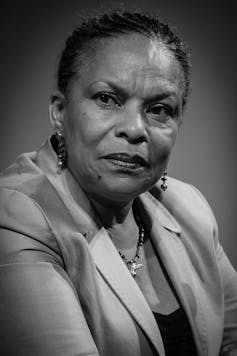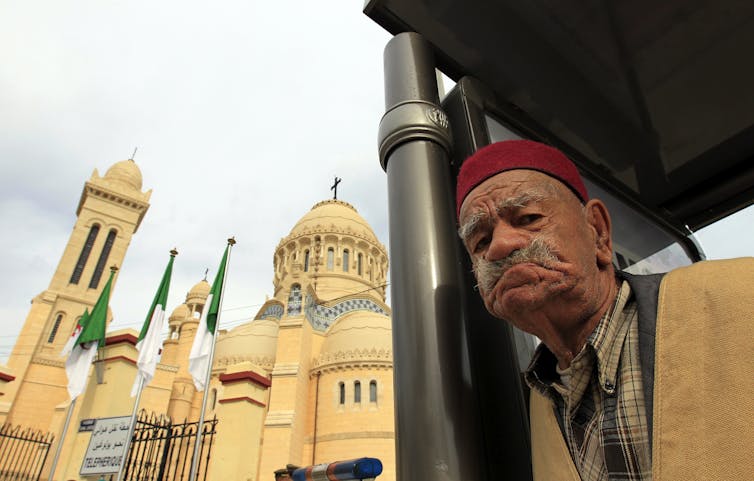When the French presidential elections begin on April 23, the world will be watching closely.
Polls are tightening up, but Marine Le Pen, of the far-right National Front (FN) Party, seems likely to get through to the second, runoff ballot on May 10. Will the xenophobic populism that brought Brexit to the U.K. and Donald Trump to the White House claim the Elysée Palace, too?
Le Pen’s expected advance has been one of the few constants in a campaign marked by surprising, dispiriting twists. To a historian of French colonialism like me, one of the most revealing is the renewed debate over the memory and teaching of the colonial past. The candidates’ positions on this issue can be seen as a revealing barometer of French attitudes toward immigration, race and multiculturalism today.
Sixty million subjects
At its height in the 1930s, the French empire encompassed some 60 million colonial subjects, from the Caribbean to Southeast Asia. But after decolonization in the 1950s and 1960s, the French relegated imperial racism, slavery and colonialism to the “historical back burner.” The eruption of the history wars finally broke this public silence in the mid-1990s.
There were two main triggers for the decade-long fight about how to remember France’s colonial history.
The first was the 150th anniversary of the French abolition of colonial slavery in 1998. Angered by the self-congratulatory celebration of French abolitionists, black and Afro-Caribbean activists demanded greater attention to enslaved Africans’ suffering.

Their efforts culminated in a 2001 law sponsored by Guyanese deputy Christiane Taubira. The “Taubira Law” “recognizes the slave trade and slavery as crimes against humanity.”
The second came in 2000, with revelations about the French army’s systematic use of torture during the Algerian War of Independence (1954-1962). Memoirs published by an Algerian nationalist and a French military officer and studies by two young French historians unleashed harsh condemnation of abuses committed in Algeria, the jewel of the French empire.
A notorious law
The supposed injustice of such criticisms of French empire is a favored theme of the National Front and its founder, Jean-Marie Le Pen, Marine Le Pen’s father and a veteran of the Algerian War. Nostalgia for the colonies jibes neatly with the FN’s nationalistic, anti-immigrant, Islamophobic ideology. Strategically, “positive” accounts of the colonial past appeal to former settlers from French North Africa, known as pieds-noirs, and to nationalist defenders of the French military.
This made colonial revisionism tempting to mainstream conservatives, too, as FN began to gain electoral ground beginning in the mid-1980s. Jean-Marie Le Pen’s shocking advance to the second round of the 2002 presidential elections spurred new conservative efforts to win back FN voters, especially the pieds-noirs.
Prime among them was the infamous law of Feb. 23, 2005, whose Article 4 specified that French school programs should “recognize the positive role of the French presence overseas, especially in North Africa.”
Historians responded with loud, public outrage. They objected to the imposition of an “official history,” the sidelining of slavery, racism and colonial violence, and the apparent endorsement of nationalist ethnocentrism. The ensuing outcry convinced President Jacques Chirac to repeal the offending Article 4 a year later.
But since then, rising protests against inequality from immigrant and minority groups and growing fears of Islamist terrorism have fueled the revival of colonial revisionism on the French Right.
History and political positioning
Among the current presidential candidates, not only the current FN leader, Jean-Marie Le Pen’s daughter Marine, but also the (now scandal-ridden) conservative candidate François Fillon have publicly endorsed revisionist colonial histories.
Marine Le Pen has long favored “rebalancing” secondary school curricula. She objects to what she calls the “masochism” of critical histories and calls for counting empire as one of the “glorious elements” of the French past. Students should be taught colonization’s “positive aspects” alongside its negatives.
Fillon, for his part, carries on the conservative attempt to peel off FN support by co-opting its rosy view of colonialism. In a speech last August, he denounced school programs that teach students “to be ashamed” of their country’s treatment of colonized peoples. Instead, textbooks and lesson plans should be revised to give a more favorable image of colonization as a “sharing of culture.”

“France is not blameworthy for wanting to share its culture with the peoples of Africa, Asia and North America,” Fillon declared, nor should it be held particularly responsible for the evils of slavery.
Also excised from Marine Le Pen’s “most positive, most flattering” version of national history is French collaboration with the Nazis during World War II. Too painful and “complex” for children, such events should be revisited only in high school, “if it’s necessary.”
Fillon agrees that primary school is no place for difficult, uncomplimentary historical topics. “Calling our history into question: this is a shameful teaching!” he protested in his August 2016 speech. Like Le Pen, Fillon sees a glorious national “narrative” (récit) as essential to national unity. Teachers should focus on figures, sites and events whose meaning lies “in the progressive construction of France’s singular civilization.”
This view of history education has been a staple of French nationalism since the Third Republic made primary public schooling free and compulsory in the 1880s. In the 19th century, lessons about the development of French civilization aimed to cultivate patriotism and civic virtue among future (male) voters and soldiers. Today, Le Pen and Fillon both seek to revive this colonial-era tradition and, by extension, the hierarchies of race and civilization that defined it.
Only one candidate has openly challenged this new revisionism: the current favorite to face Le Pen in the second round, centrist former Economy Minister Emmanuel Macron. Macron made waves in February by telling an Algerian television station that French colonization in North Africa was a “crime against humanity.”
“Colonization is part of French history,” he said. “It is a true barbarity and a part of that past we must confront head-on, while also apologizing to the women and men against whom we committed these acts.” He went on to specifically denounce any effort to glorify colonization, as Article 4 had tried to do in 2005.
These are forceful words that might have signaled a shift in official discourse on colonial history, had the speaker been willing to stand by them.
He wasn’t.
When the Right and pied-noir groups accused him of indulging in unpatriotic, leftist “repentance,” Macron folded. Only four days later, he apologized not to the victims of colonization but to the pieds-noirs.
Equally damning, Macron’s Algiers statement was a flagrant about-face from an interview he did last November with the French magazine Le Point. Then, he had earned condemnations from the left for saying that “the reality of colonization” included “elements of civilization and elements of barbarity.”
Macron’s shifting position on French colonization is clearly opportunistic, making it hard to tell what he really thinks about it. But perhaps what matters most is that he saw taking a position on the colonial past as a political opportunity in the first place. In the current election, as in the history wars of 20 years ago, colonial history has once again become political.

